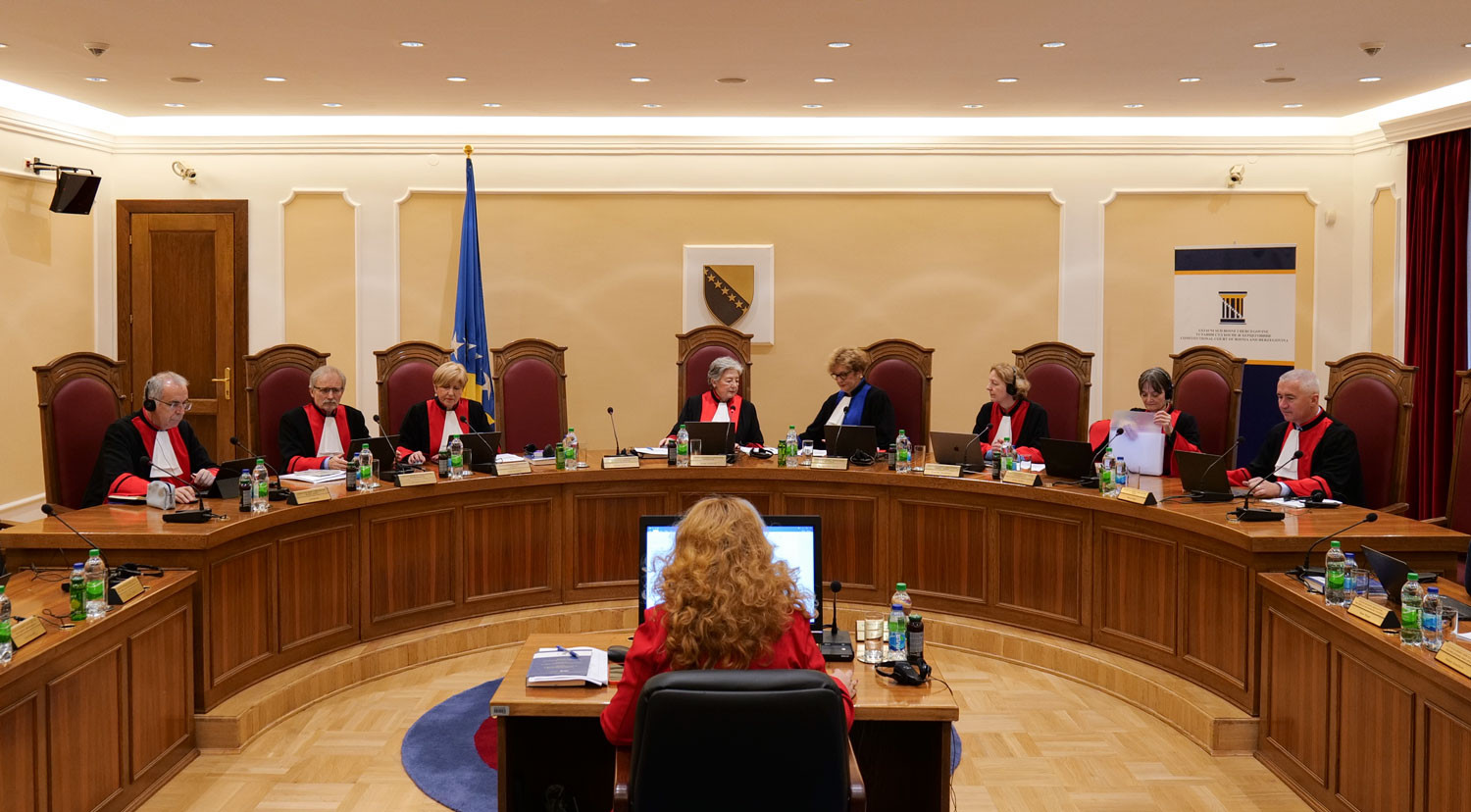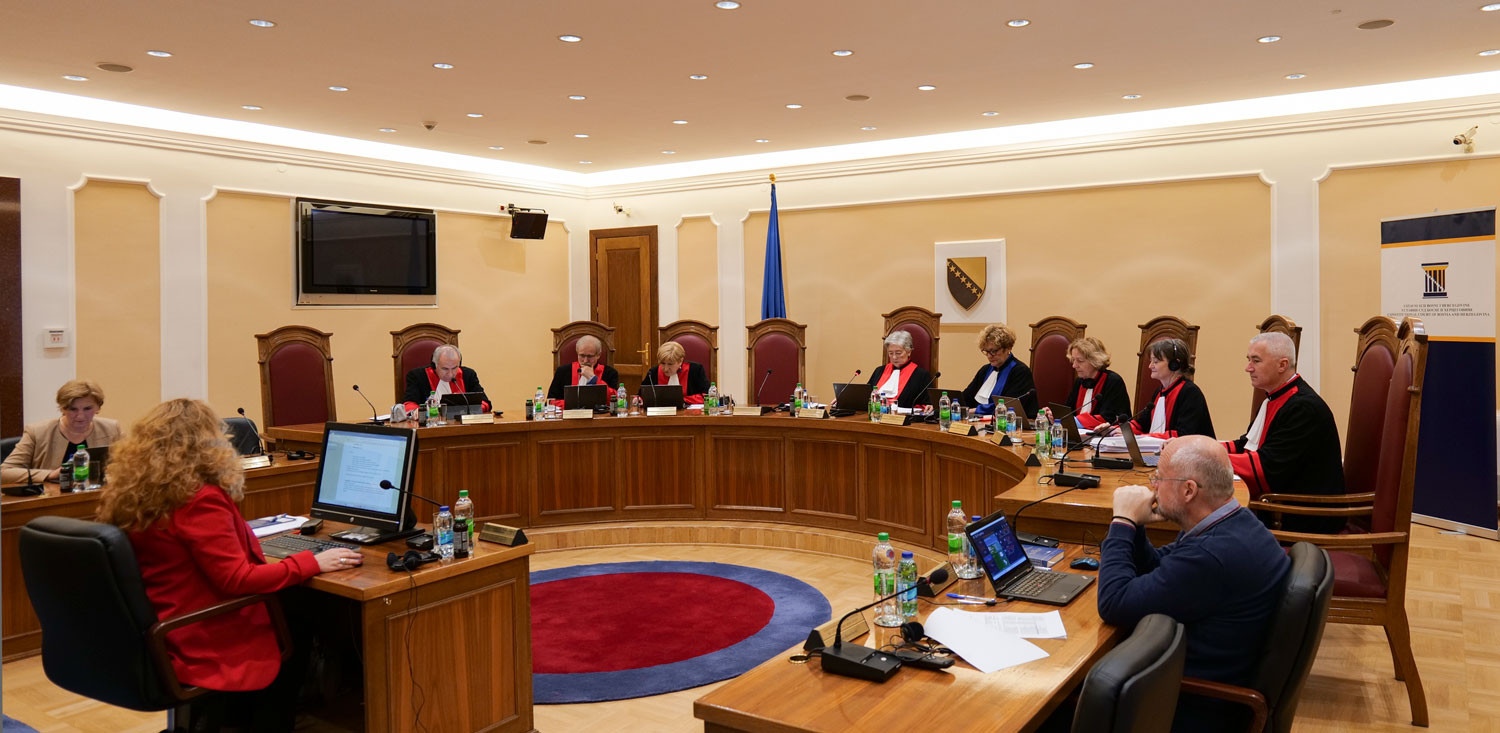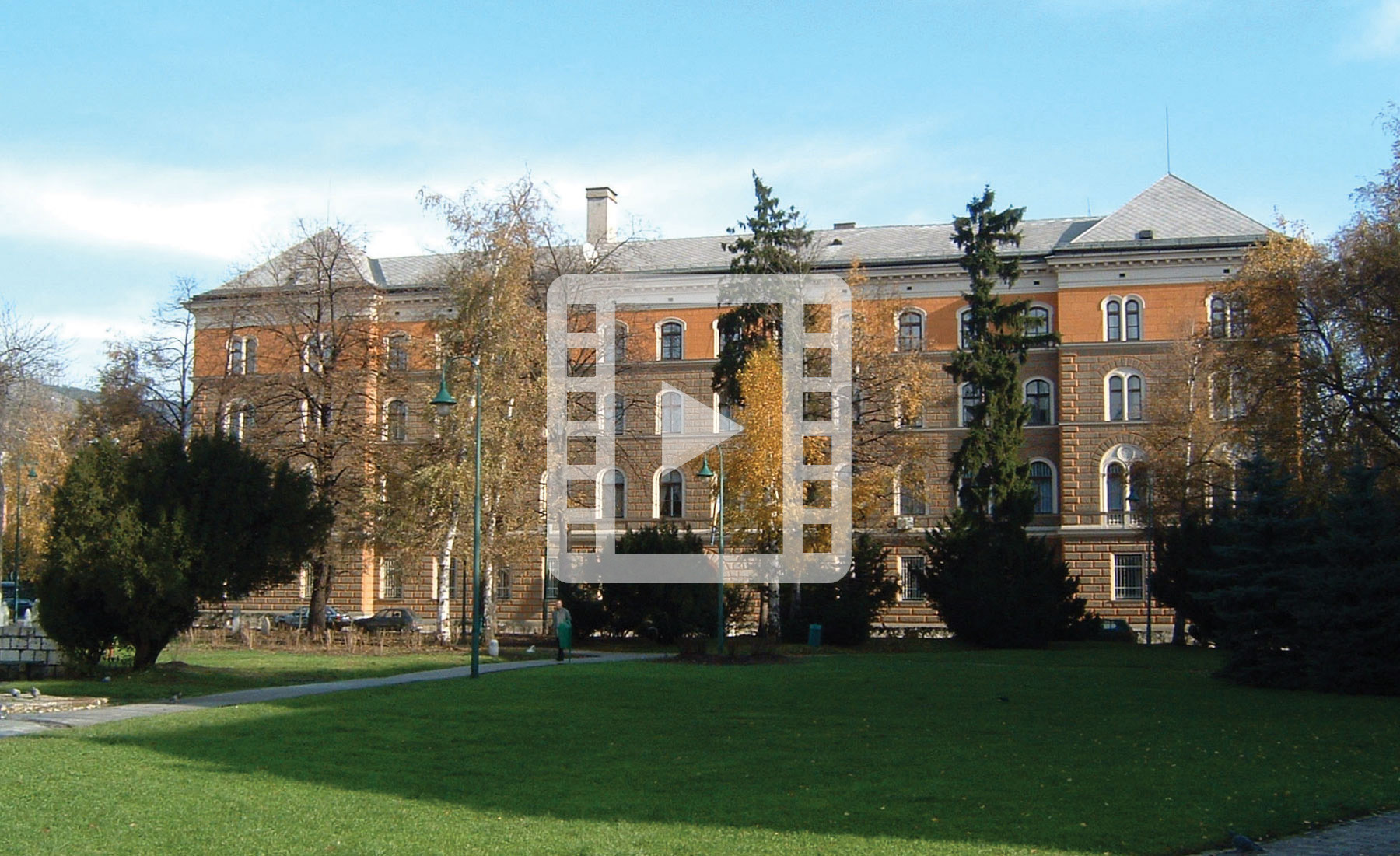On 14 November 2024, the Constitutional Court of Bosnia and Herzegovina held its 150th plenary session, where it considered requests for constitutional review and appeals, and decided other issues relevant for the work of the Constitutional Court.
At this session, the Constitutional Court adopted the Report on the Enforcement of Decisions of the Constitutional Court of BiH for the period from August 2023 to November 2024.
Of the decisions adopted at the plenary session, the Constitutional Court singles out the following:
U-6/24 (Ruling on Non-Enforcement) - In this case, the Constitutional Court adopted a ruling on non-enforcement of the Decision on Admissibility and Merits no. U-6/24. By the ruling, the Constitutional Court established that the Government of the Republika Srpska - Radovan Višković, as the Prime Minister of the Republika Srpska, and the Ministry of Trade and Tourism of the Republika Srpska - Denis Šulić, as the Minister of Trade and Tourism of the Republika Srpska, failed to enforce the decision of the Constitutional Court no. U-6/24 of 11 July 2024. Pursuant to Article 72(6) of the Rules of the Constitutional Court, this ruling shall be communicated to the Prosecutor's Office of BiH for further actions in accordance with the law.
By the Decision no. U-6/24 the Constitutional Court granted the request of 13 Members of the House of Representatives of the Parliamentary Assembly of BiH and determined that the Decision on the Method and Conditions of the Sale of Real Property owned by the Republika Srpska located within the Special Area of Jahorina, by public bidding (Official Gazette of the RS, 114/23) is not compatible with the provisions of Article I(1), I(2) and VI(5) of the Constitution of Bosnia and Herzegovina.
U-11/24 – In this case, the Constitutional Court deliberated on the request filed by the Municipal Court in Sarajevo (Judge Erdin Šabić) for review of constitutionality of the Law on the High Judicial and Prosecutorial Council of Bosnia and Herzegovina (Official Gazette of Bosnia and Herzegovina, 25/04, 93/05, 48/07, 15/08, 63/23 and 9/24) and the Rules of Procedure of the High Judicial and Prosecutorial Council of Bosnia and Herzegovina (Official Gazette of Bosnia and Herzegovina, 55/13, 96/13, 46/14, 61/14, 78/14, 27/15, 46/15, 93/16, 48/17, 88/17, 41/18, 64/18, 12/21, 26/21, 35/21, 68/21, 1/22, 26/23, 83/23, 9/24 and 27/24). It was established in the decision that the contested Law and Rules of Procedure are in conformity with Article I(2) of the Constitution of BiH. In the reasons the Constitutional Court pointed out, inter alia, that the contested Law and Rules of Procedure, which have been in legal force at the time of the adoption of this decision, prescribe the right for a judicial office candidate to institute a court dispute against a decision on appointment before the Court of Bosnia and Herzegovina, and an obligation of the HJPC to communicate the reasons to the candidate for which he/she has not been appointed to a judicial office.
U-14/24 – In this case, the Constitutional Court deliberated on the request filed by four Delegates to the House of Peoples of the Parliamentary Assembly of Bosnia and Herzegovina seeking a review of constitutionality of Articles 3, 4 and 6 of the Law on Immunity of the Republika Srpska (Official Gazette of the RS, 39/24). Under the decision, it was established that granting of immunity from criminal liability to holders of executive power by Article 3 is not compatible with the Law on Immunity of BiH, and, consequently, not compatible with the Constitution of BiH as well. The BiH Law on Immunity does not prescribe the immunity from criminal liability to holders of executive power. It only prescribes the immunity from civil liability within the scope of their duties. The Constitutional Court concluded that the granting of immunity from criminal liability to holders of executive power is not justified by “overriding public requirements” allowing a departure from one of the fundamental principles of rule of law prescribing equality of perpetrators of criminal acts. The Constitutional Court also concluded that the provisions of Articles 6 and 7 of the RS Law on Immunity are not compatible with the Constitution, as they completely exclude ordinary courts from deciding on immunity and as there is no two-instance decision-making process, which is in contravention of the BiH Law on Immunity and thereby also of the Constitution of BiH.
AP-5007/23 (Goran Dragičević and Predrag Đuričić) – In this case the Constitutional Court found a violation of the appellants’ right to a fair trial. The Constitutional Court holds arbitrary the conclusion of the Pension and Disability Insurance Fund of the Republika Srpska and the Supreme Court that there were no legal conditions for applying the provisions of Article 136a of the Law on Police and Internal Affairs (“the Law on Police”) to the calculation of the amount of the pension to all police officers, but only to the police officers of the Ministry of the Interior of the Republika Srpska. The appellants were police officers of the Border Police of BiH with residence in the RS. Their contributions were paid to the budget of the RS and they acquired the right to pension by working “under special conditions” and were therefore entitled to an accelerated retirement plan. However, the Pension and Disability Insurance Fund and the Supreme Court treated them differently from police officers who exercise the same right as members of the RS Ministry of the Interior. In addition, the Supreme Court did not offer relevant justification and reasons for such difference in treatment of the appellants. Based on the foregoing, the Constitutional Court concluded that the judgment of the Supreme Court was adopted without taking into account the special circumstances that could affect the outcome of the proceedings and that the Supreme Court did not even try to view the provision of Article 136a of the Law on Police in a wider context and in relation to the appellants’ constitutional rights and the rights under the European Convention.
AP-667/24 (F. H. and Others) – In this case, the Constitutional Court granted the appeal lodged by F. H. and the legal entity F. H. Srebrena malina d.o.o. and established a violation of the appellants’ right to a fair trial in the part of the contested judgment of the Court of BiH that ruled on the appellants’ argument that they were not aware of the charges against them. The Constitutional Court holds that the doubt has not been removed from the submitted judgments as to the allegation that the appellants faced the legal classification of the offence they were convicted of in the first-instance judgement for the first time, which in turn, made them unable to prepare their defence. For that reason, the Constitutional Court decided to remand the case in this part to the Court of BiH that will remove the found violation of the appellants’ right.
In addition, the Constitutional Court granted the appeal lodged by F. S. and F.N. in part and found a violation of the right to a fair trial in relation to the presumption of innocence of these appellants in the procedure of determination of a “criminal charge” in connection with the statements made by certain public officials during the criminal proceedings. In relation to other allegations, the appeal lodged by F. S. and F.N. was dismissed. The Constitutional Court concluded, inter alia, that these appellants were convicted of the same criminal offence with which they were charged, and that the court did not violate the subjective and objective identity of the indictment with certain modifications of the judgment, in respect of which the Court of BiH gave detailed and clear reasons. The Constitutional Court also noted that the court, by analysing the evidence it admitted and assessed both individually and in relation to each other, reached the conclusion that F. S. and F. N. committed the criminal offence as charged and that there is nothing indicating that there has been a violation of the in dubio pro reo principle.
With respect to the public pronouncement of the judgment, the Constitutional Court established that the judgment of the court was made public by reading aloud the enacting clause and that the parties and the public were invited. The fact that the court did not read aloud the entire enacting clause on that occasion, that is, that it omitted certain parts of the judgment, cannot lead to the conclusion of a violation of the right to publication of the judgment. The appellants were informed of the decision and the Court of BiH determined that the original of the judgment was identical to the written copy. As to the media reports, the Constitutional Court holds that there is nothing that can lead to the conclusion that a convicting decision was made because of the media reporting on these proceedings, that is, that it had an influence on the court in making its decision.
AP-1665/24 (D.K.) – In this case, the Constitutional Court concluded that there has been no violation of the appellant’s right to a fair trial as the disciplinary procedure against the appellant was conducted in accordance with the Law on HJPC and the Rules of Procedure of HJPC and as the competent bodies of the HJPC conducted an evidentiary procedure and established the appellant's liability under Article 57(6) of the Law on HJPC. The Constitutional Court concluded that the competent bodies reasoned their conclusions sufficiently clearly and that the extent of the evidentiary procedure warranted the decision extending the time limit for the finalization of the disciplinary procedure. The Constitutional Court also determined that the appellant failed to raise the objection as to impartiality of the tribunal in the appeal against the decision of the Second Instance Disciplinary Commission for Prosecutors, which is the reason why that objection could not be successfully raised in the appeal before the Constitutional Court for the very first time.
All decisions adopted at the plenary session will be delivered to the applicants/appellants within one month. They will be published as early as possible on the website of the Constitutional Court of BiH.




